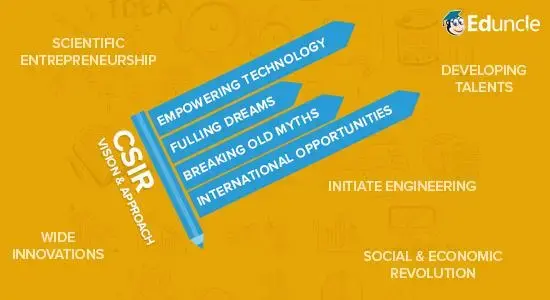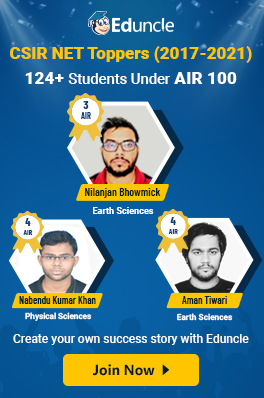
We are living in a world, where science is practiced as a way of thinking and we are at the global frontiers of achievements in science and technology. This leads the young Indians to choose a career that provides them a platform to show their ability in these fields.
At the same time, when you draw your attention towards scientific and industrial research career, you come across the name of one of the eminent organizations coordinated with research and development (R&D) activities, the Council of Scientific and Industrial Research (CSIR).
NTA conducts Joint CSIR UGC NET Exam, which is also known as CSIR NET, is the prestigious exam among the aspirants who want to make your career in for research and lectureship field. The exam has its own importance in showing the correct path to the aspirants, who have made scientific and industrial research as their career destination.
Before knowing the complete details regarding the exam and choosing it as an approach to set your career, first, you should make a research about the organization, its achievements & milestones.
Here, you will find the following details about the CSIR: -
Achievements in the decade 1950-60
Achievements in the decade 1970s
Achievements in the decade 1980s
Achievements in the decade 1990s
Achievements in the decade 2000s
Brief History of CSIR
Council of Scientific & Industrial Research is a premier industrial R&D organisation in India, which got registered under the Societies Act 1860.
CSIR was established in 1942. It was ranked 19th among the top 303 Government Institutions across the world by Scimago Institutions Ranking World Report in 2021.
Following ventures were responsible for the establishment of CSIR:
1. Re-engineering the Organisational Structure
2. Linking Research to Marketspace
3. Mobilising and Optimising the Resource Base
4. Creating an Enabling Infrastructure
5. Investing in High-Quality Science
Here we are trying to provide the information about vision, achievements, milestones and career opportunities of CSIR.
| Download Free CSIR NET Material for All Subjects [Trusted & Recommended by 4600+ Selected Students] |
| Updated Syllabus for All Subjects |
| Sample Theory Notes |
| Model Test Papers with Solution (Part A, B & C) |
| 5 Previous Exam Papers with Answer Keys |
| Complete Study Plan for Part A |
| Paper Analysis by Eduncle Experts |
| Personalized Guidance by Subject Experts |
CSIR Vision - CSIR Envisions to Fulfill the Aspirations of Modern India
CSIR was entrenched with an overall motive to give all the sectors of the country’s economy a scientific and technological base. CSIR contributes to industrial competitiveness, the welfare of the society and advancing the fundamental knowledge that will lead to economic development of our country.
Presently, CSIR’s mission is to build a new CSIR that will fulfill the needs of modern and digital India.
What makes the organization renew itself are some future illustrations like:
To push the country and country people towards science and technology.
To fulfill the emerging dreams of the nation.
To broke some old myths of economy and growth.
To transform the national needs into international opportunities.

To actualize the above-listed synopsis of modern India, CSIR is moving towards the following grounds:
Science and Engineering leadership
Innovative technology solutions
Open innovation and crown sourcing
Nurturing talent in transdisciplinary areas
Science based entrepreneurship
Socio-economic transformation through S & T intervention
Major Achievements of CSIR - Innovations Over 60 Years
CSIR with its 38 research laboratories has been designed to promote all the disciplines with good technical knowledge and innovating techniques.
CSIR had set many milestones covering all the sectors of Indian economy like Aerospace, Biotechnology, Chemicals, Drugs & Pharmaceuticals, Energy, Food & Food Processing, Information Dissemination, Leather and Metal, Minerals & Manufacturing etc.
On 26th April 2018 (World Intellectual Property Day), CSIR was awarded the National Intellectual Property Award, 2018 for being the top research and development organization for patents and commercialization.
Below, we are sharing major achievements targeted by CSIR in every decade:
CSIR Achievements in the Decade 1950-60
Indelible Ink
You might not be aware of the fact that during the general elections about 600 million people wear a CSIR mark on their fingers.
The deep blue ink used at the time of elections to mark on the voters’ fingers was developed by CSIR in the year 1952.
Now, many industries are producing the ink and it is also exported to Sri Lanka, Indonesia, and Turkey etc.
Amul Milk
In India at the period of the 1960s, baby milk food was imported from other countries. The multinationals rejected our requests to set up manufacturing facilities.
The reason was the lack of cow’s milk and too much fat in buffalo milk.
Then CSIR came with a process of manufacturing baby milk food from buffalo milk with less fat and good digestibility. This idea was given to Kaira Milk Producers Cop. Ltd.
CSIR Achievements in the Decade 1970s
Swaraj Tractors
In the 1970s, Indian economy was basically depended on agriculture and facing the Green revolution. At that time manpower, along with excellent machines were needed.
Like a great boon, CSIR introduced Swaraj tractors. In the year 1974, Punjab Tractors Ltd. began its manufacturing.
Crop-friendly Pesticides
Our agriculture depended on hybrid seeds and protection from pests.
CSIR helped in the production of new pesticides production at one time with the help of an integrated programme.
Safe Drinking Water
To solve the safe drinking water problems, CSIR introduced many techniques like groundwater prospecting, Novel rainwater harvesting, techniques to remove bacteria, viruses and chemicals and “Nalgonda technique” to remove excess fluoride.
Download CSIR NET 2022 Notes by Experts
CSIR Achievements in the Decade 1980s
The Power of Parallel Processing
India was looking for computing power in the 1980s. India was not able to import them. As a solution, CSIR connected several sequential computers in parallel to get supercomputing power. India’s first parallel computer “Flosolver” was built in 1986 followed by “PARAM”.
Special Glasses
CSIR established the first glass manufacturing unit. Since then CSIR had developed about 400 types of special glasses.
Kangra Tea
Kangra is a district in Himachal Pradesh, which is famous for its green tea. But meanwhile, the production was declined.
CSIR introduced a technique to solve the problem and improved the growth of plantation.
The Bamboo Breakthrough
The plant of bamboo performs the process of flowering once in its lifetime (once in seven to a hundred years).
It was taken as a miracle when CSIR developed tissue culture technology that made bamboo flowering possible within a week. This step of CSIR was first ever in Indian science and created history.
Cleaning Coal
The quality of coals in India varies from poor to rich grade. To clean the coal and upgrade its quality CSIR invented technologies.
It helped in upgrading over 29 million tons of coal with twenty coal washeries.
CSIR achievements in the decade 1990s
The Menthol Mint
The farmers of Terai regions of Himalayas are engaged with oil-yielding mint plants. These mint plants are Menthol Sinesis developed by CSIR.
With the efforts of CSIR in developing the high yielding varieties of Mint, India is now the largest producer of menthol mint.
GenoMed
It’s the first kind of knowledge alliance created by CSIR accompanied by an Indian pharma company.
It helped in realizing the benefits from human research genome in the form of affordable health care for Indian people.
It resulted in the Centre for Genomic Applications (TCGA) in catalyzing research in India.
Catalyzing Change
In the 90s, multinational companies had their domination over the Catalyzing Industries.
India used to import these catalysts from them. But CSIR changed the process of transferring from each other by inventing the Zeolite technology.
Now India started transferring the Zeolite technique to other multinationals.
Leather Technology Mission
In the 1990s the leather industries were in a bad state. 700 tanneries were ordered to close as they were highly polluting.
To make a solution CSIR had introduced a Leather Technology Mission (LTM) in 1995. It included 170 programmes along with 60 NGOs and supplied skilled manpower with the establishment of 20 training centres. As a result, 270 closed tanneries were renovated.
CSIR Achievements in the Decade 2000s
Hansa & Saras
In 1993 CSIR has introduced Hansa, India’s first all-composite flight, and the maiden flight was carried out. It was a two-seater aircraft. Hansa got certified by DGCA in 2000.
After Hansa, CSIR developed Saras. It is a 14-18 seater multi-role aircraft that had its maiden flight on 22nd August 2004.
These all were the major milestones set by CSIR (Council of Scientific and Industrial Research) with a motive of social development.
After getting aware of these figures and fact, you will surely be interested in being a part of CSIR’s glorious history and upcoming breakthroughs.
To experience the career opportunities in the organization, we will help you and provide the latest information for recruitments in CSIR.
Momentous Evolution by CSIR - Developing Various Fields
CSIR has also introduced some notable developments in various fields, let’s get precise knowledge about them.
Biology and Biotechnology
DNA Fingerprinting.
Cybrid facility for the study of neurodegenerative diseases.
The genotype “CIM-Arogya” of Artemisia annua for higher artemisinin yield.
Health Care
Early detection of cancer and visceral leishmaniosis.
Biomarker for Asthama.
Anti- malarial drugs-Elubaquine and Arteether.
Oral delivery of Insulin and Hepatitis B vaccine.
Centchromon, a non-steroidal contraceptive (marketed as “Saheli”).
Agro & Food
Shelf-stable food products.
Palm oil processing plant.
Natural food colours.
Vegetable salt.
Tea wine.
Biodegradable wrapping material.
Chemicals
Manufacture of hydrofluorocarbons.
Catalytic process- Trifunctional catalysts.
Conversion of methane and methanol into gasoline.
Electroactive polymers.
Micro and Nano structured polymeric materials.
Ultrafiltration membrane for water purification.
Leather
Paradigm shift in leather processing.
Indian presence in the fashion world of leather through ModEurop Congress.
Ecology & Environment
Preparation of Fourth assessment report of the international panel on climate change that won Nobel Prize for peace in 2007.
Air Quality, inventorization etc.
Industrial waste management.
Rapid analysis of biological oxygen demand.
Earth Sciences
Studies of Gondwana land.
Geochemical baseline maps in Cauvery basin.
New criterion for monsoon breaks.
Prediction of tropical cyclones.
VSAT network [WAN]

Electronics & Instrumentation
High dielectric constant materials for metal oxide semiconductor devices.
First even Silicon carbide Schottky diodes in the country.
Cost effective medical equipment.
Pressure sensors using MEMS technology.
Electronic instrumentation for traditional industries.
Energy
Advanced catalysts for mercaptans removal.
Conversion of light naphtha to LPG and gasoline.
Oxidative desulphurization of diesel.
Aerospace
Novel ceramic barriers lining material and process for rocket thrusters.
Transmissometer Drishti.
Cost effective rapid resin injection modeling technology.
Mining, Minerals & Materials
Microwave assisted combustion synthesis of magnetic alloys.
Beneficiation of iron-ore using Floatex density separator.
Self-cleaning coatings on glass.
HAP-coated dental implants.
ADI Technology for crankshafts for Indica V2 diesel car.
Housing & Construction
Comprehensive methodology for transport planning of metros.
Strategies for disaster mitigation.
Aerodynamically shaped cyclone shelters.
Low-cost housing in disaster-affected areas.
Energy-saving buildings.
Rural Development
Swaraj tractors.
Post-harvest techniques.
Cheapest water purification technologies.
Technological upgradations of the skills of rural artisans and entrepreneurs.
Information Dissemination
Software capable of decoding protein sequences in genetic materials of all living organism.
Software using auto trace methodology for digitizing aeromagnetic data.
E-journal consortium.
International S&T Networking
Global networking with major R&D organizations including Global Research Alliance.
Partnership with the UK with external cash flow of over Rs. 12 crores in UKIERI Projects in 2006.
Setting up of Joint Research Centres.
Download Free Study Plan & Boost your Learning
CSIR Career & Opportunities: Explore the Endless Prospects in Research
For a long time, the Council for Scientific and Industrial Research (CSIR) is playing the role of promoting, maintaining, and raising the values of human resources into the Scientific and Technological aspects of the economy.
The organization is providing career opportunities to all age groups who are eligible to join CSIR and making their presence as an improved and high-performance organization in the country.
All the recruitments and job-related activities are commenced and controlled by the Recruitment and Assessment Board of CSIR (RAB).
What are the activities executed by the Recruitment and Assessment Board (RAB)?
The activities performed by CSIR-RAB can be understood as follows:
Assessment promotion of CSIR Scientists
Junior Scientist up to Principal Scientist.
Senior Principal Scientist to Chief Scientist including centralized screening.
Recruitment of Scientists
Scientists to Principal Scientists.
Centralized selection of Chief Scientists.
Read the Life Journey of BAPUJI MARINGANTI (A former Scientist at CSIR).
Recruitments, Fellowships & Grants under CSIR: Link your Career
CSIR, along with the recruitments of scientists, provides job opportunities by offering various fellowships and lectureship programmes.
To select candidates for these programmes Human Resource Development Group (HRDG), NTA will conduct the CSIR recruitment exams twice a year, i.e. in June and December.
The process to enter the CSIR Recruitment is explained below with every important step:
In the above-given information, we have apprised you with the largest research and development organization in India, the Council of Scientific and Industrial Research (CSIR) along with its achievement and opportunities for young India.
If you want to see yourself participating in the scientific and technological challenges of the country, set the path through CSIR NET exam.
Eduncle always aims to provide you with complete and accurate information. If the information provided above has helped you answer your queries, please do share it with your friends.
In case, you are having any doubt, feel free to place them in the comment box given below.
Thank You!!





















